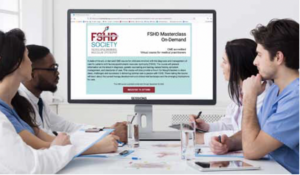 by Jamshid Arjomand, PhD, chief science officer
by Jamshid Arjomand, PhD, chief science officer
It can take nearly a decade for the average person with FSH muscular dystrophy to get a correct diagnosis. Once they are finally diagnosed accurately, a person may still face on an equally frustrating quest to find knowledgeable clinicians − doctors, physical therapists, pulmonologists, and other specialists −who understand FSHD and can help manage their symptoms. It’s hard to fault the clinicians. There are more than 7,000 rare diseases, and most doctors will see at most a handful of FSHD patients, if any, in their career. Yet that’s no consolation for patients. We must find ways to motivate clinicians to learn to recognize FSHD symptoms and understand the best practices in caring for their patients with FSHD.
There is another reason it is so important to improve the quality of care. We are now in the age of clinical trials for FSHD, and if individuals who are in a trial are not all receiving the same high standard of care, that could have negative impacts on a trial. Imagine, for example, if a subset of patients in a trial is receiving physical therapy and mental health counseling, while others are not. Or what if some patients have undetected breathing issues that are affecting their energy level? Such disparities can have an impact on patients’ outcomes during a clinical trial and introduce “noise” that can make it harder to understand the effects of the FSHD drug that is being tested.
The situation demanded a response, so this year, the FSHD Society produced a continuing medical education (CME) course called FSHD Masterclass. This is an on-demand course taught by top FSHD experts, which doctors can take to earn credits that they need to maintain their license to practice medicine. The CME credits are a great motivator for doctors to take the course. Now we just need doctors to know that the course exists. That’s where you come in. Tell your doctors about the FSHD Masterclass. They will pay attention to you, their valued patient, rather than to an email from us buried in an overflowing inbox!
You can also write a letter using our CME-Dear-Doctor-letter-template.
Thank you for taking this extraordinary measure to help improve medical care for everyone with FSHD!


Leave a Reply